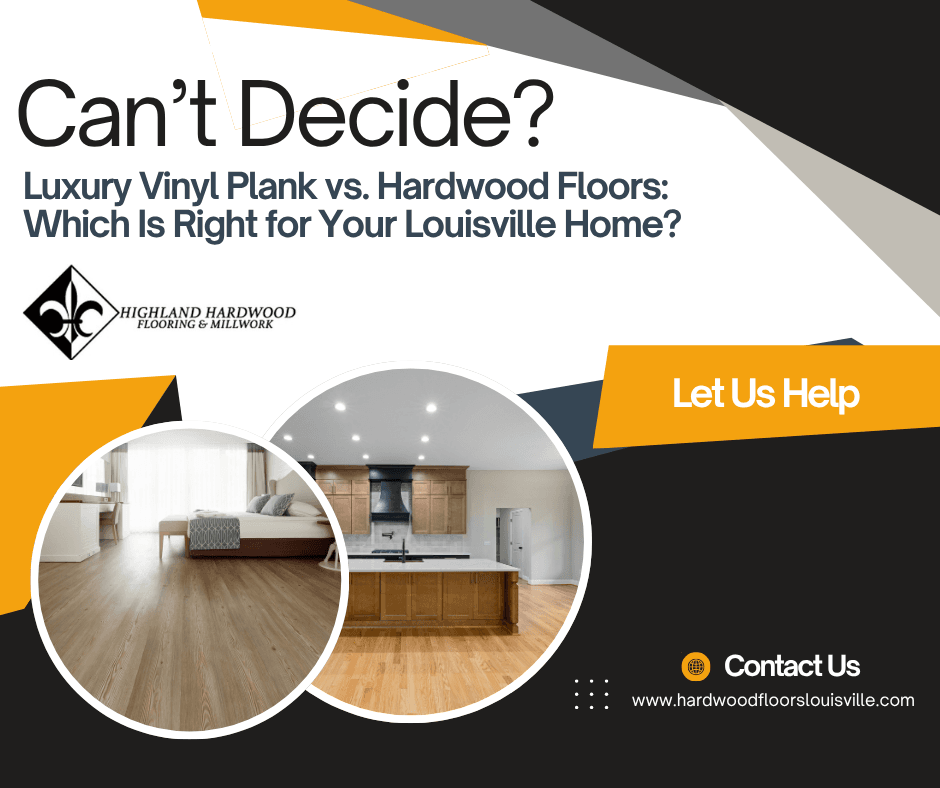When it comes to new flooring, Louisville homeowners often find themselves torn between luxury vinyl plank (LVP) and real hardwood floors. Both options are stylish, durable, and popular — but they’re very different materials with their own strengths and trade-offs.
Here’s what you need to know before deciding which floor fits your home, lifestyle, and budget.
1. The Look and Feel
Nothing matches the natural warmth and character of real hardwood. Each plank features unique grain patterns and color variations, lending your home a timeless appeal.
Luxury vinyl plank, on the other hand, does an impressive job mimicking the look of wood — and high-end brands can fool the eye at first glance. But underfoot, LVP feels slightly softer and less substantial than true wood.
If authentic beauty and craftsmanship matter most, hardwood wins.
2. Durability and Maintenance
LVP is designed for durability. It’s resistant to scratches, dents, and moisture — making it ideal for basements, bathrooms, and busy households with pets or kids.
Hardwood is durable, too, but it requires a bit more care and maintenance. It can be refinished multiple times over its lifetime, which means it can literally last for generations. However, it’s more sensitive to humidity changes — something Louisville homeowners know all too well.
If you want low-maintenance toughness, choose LVP. If you want long-term value and refinishability, go with hardwood.
3. Cost Comparison
Luxury vinyl plank is generally less expensive to purchase and install.
Hardwood is an investment, but one that pays off with higher home resale value and timeless style.
LVP saves upfront; hardwood builds long-term equity.
4. Environmental Impact
Hardwood floors are made from a renewable resource and can last 75–100 years when properly maintained. Many species come from sustainably managed forests.
Luxury vinyl, while durable, is made from synthetic materials and isn’t biodegradable, though some brands now offer recycled options.
Hardwood is the more eco-friendly choice.
5. Installation and Comfort
LVP can often be installed quickly as a “floating floor,” which means it locks together without glue or nails. It’s a good choice for DIYers or for covering existing floors.
Hardwood installation requires a professional touch, especially if you want perfect seams, transitions, and long-term stability. It also adds a sense of warmth and comfort you can’t replicate with vinyl.
LVP is fast and easy; hardwood is a custom, craftsman-level upgrade.
Final Verdict
Both flooring types have a place in today’s homes.
Choose Luxury Vinyl Plank if you need a durable, waterproof, budget-friendly solution for high-traffic areas.
Choose Hardwood Floors if you want a timeless, natural, and long-lasting investment that adds warmth and beauty to every room.
At Highland Hardwood Flooring and Millwork, we help homeowners compare options, understand pricing, and achieve the look they love — whether that’s genuine white oak or a realistic vinyl plank alternative.
Ready to explore your flooring options?
Contact us today for a free in-home consultation and estimate.



